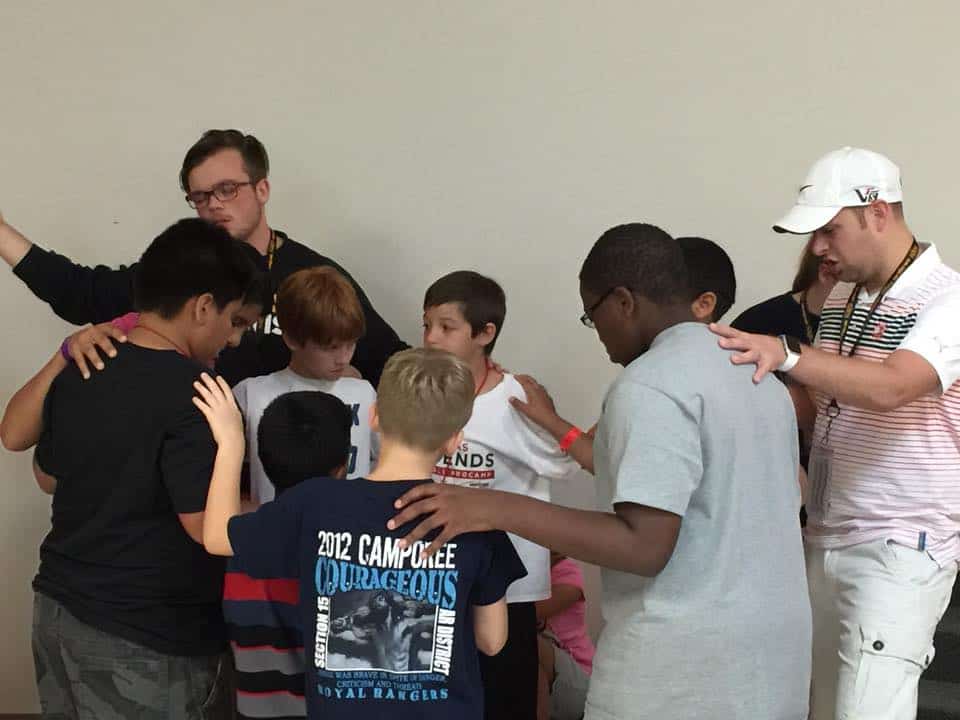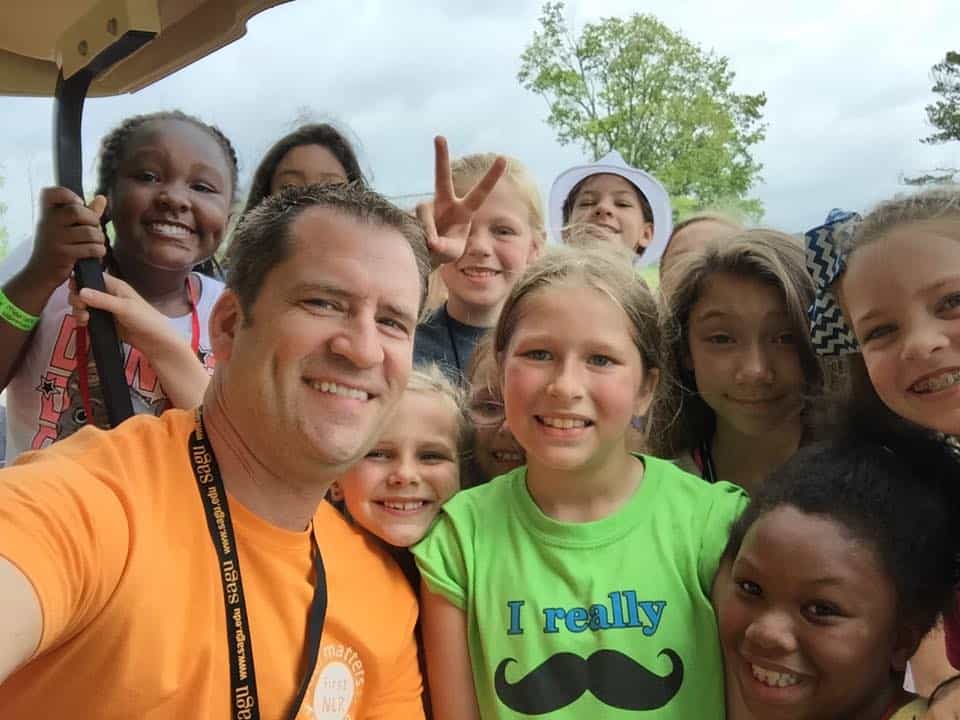Share with your friends!
As part of the KidMin Mentoring Course, I am excited to bring you an interview with Brian Dollar from High Voltage Kids Ministry. I pray that you will be encouraged by his words and pick up practical ideas that you can use in your Children’s Ministry.
FFS: Hey Brian! For those who might not know you, please tell us a little about yourself.
Brian: I am the Kids Pastor at First Assembly of God, North Little Rock, Arkansas since 1999. I also founded High Voltage Kids Ministry Resources in 1998, which creates and provides Kids Church Curriculum, Music, Games, Videos, and more to churches around the world.
I have had the privilege of speaking at many Kidmin Conferences, Workshops, Seminars, etc. I have a passion for passing on what God has enabled me to learn from my years of ministry and learning from other Kidmin Leaders! I am also the author of “I Blew It!”, “Kidminnovation”, and “Talk Now And Later.”
I have been married for 18 years to Cherith and have two amazing children – Ashton (age 16) and Jordan (age 14).
FFS: How did you get started in Children’s Ministry?
Brian: Pastor asked me to fill in for a few months. God showed me over the next couple years that Kids Ministry was what he had planned for me. Never looked back since!
FFS: How do you recruit volunteers and keep volunteers?
Brian: This is one of the most difficult tasks of a Kidmin Leader – Recruiting Volunteers. I can tell you, there is no magic formula. The only way to recruit successfully is by CONTINUOUS hard work and adherence to a few key principles. However, there are three important keys that I live by. Hopefully they will help you to build a strong team of leaders to serve the children of your church.
Keys To Adding MORE Volunteers To Your Ministry Team:
1) Don’t recruit from a NEED, rather recruit from an OPPORTUNITY.
There is nothing worse than a Children’s Ministry Director standing up in front of the congregation and saying, “We are so overwhelmed. We MUST have help! PLEASE HELP US!“ That tells the person listening: “There must be a reason no one is working with them.”
NEVER use the phrase, “No one wants to help!” OR “I can’t get anyone to help me!” That’s like my son starting off a question, “I know you are going to say NO, but…”
Rather than moan about how much we need help, choose to celebrate the growth and excitement of your Kids Ministry. Don’t talk about what you DON’T have, talk about what you DO have – opportunities for the member of your church to make an eternal impact on a soul for whom Christ died.
2) Recruit from the VISION of your ministry.
Start by raising the value of children’s ministry inside your church. Share stories in church services about life change in children or have volunteers share stories about how their lives have been changed. Serving in children’s ministry is an opportunity to honor God—not a duty or a task(Col. 3:23).
You are recruiting by giving people an opportunity to be a part of what God is doing in the lives of the children of your church. Explain to them, “God is going to accomplish His plan in the lives of the children in our church. The question is not ‘WILL God do it?’ The question is ‘WILL YOU be a part of it?’”
3) Recruit One-On-One and Face-to-Face.
Rather than putting a blurb in the bulletin, a video announcement, or a pulpit spot from your Senior Pastor, recruit by approaching people one-on-one and having a meaningful conversation with them.
Pray ahead of time who God is preparing to serve (Luke 10:22). Once He leads you to someone, approach them. Don’t just walk up in the hallway at church – that doesn’t communicate value to someone. Instead, invite them to lunch, call them on the phone, or go out to eat with them after church.
Explain to them that as a result of what God is doing in your Children’s Ministry, an opportunity has arisen. You have been praying about who the person should be to serve in this area. You felt led to talk to them because you feel that they have the right gift mix to be able to make a Kingdom difference in the lives of these kids.
I know that adding volunteers to your team is a lot of work! But, I can honestly tell you that EVERY BIT of that work is WORTH IT!! Get out there and build your team so you can win the lost!!!
FFS: A personal invitation makes a huge difference. How do you involve parents in your ministry?
Brian: Here are 8 things that we do –
- Parents serve in all aspects of the ministry: hospitality, security, teaching, etc.
- We involve parents in water baptisms for their kids.
- We have a comprehensive strategy to strengthen families. We coordinate our kids’ ministry efforts with the Sunday morning services, the small groups ministry, classes, concerts, seminars, and everything else.
- We coordinate the content for every age group in the church so we’re all studying the same passages and learning similar lessons. This way, parents, children, and teenagers can have meaningful conversations about what they’ve heard in church.
- We include a Family Devotion in the weekly bulletin to give parents a simple, clear tool to lead their children in a spiritual discussion based on Sunday’s message.
- We have started conducting classes to train parents to talk to their kids about important topics, such as salvation, sex, drugs, friends, tragedy and loss, making good decisions, and death.
- We’ve designated every Sunday night as our “Family Service” so kids and their parents can worship together—and we don’t worry about distractions.
- To elevate the importance of the parents’ role, we’ve taught a number of sermon series on family dynamics, communication, forgiveness, understanding, and love. We come back to these important issues regularly and often.
FFS: I love those ideas!! How do you keep the attention of the kids with whom you are working?
Brian: Here are some great teaching tips –
- When teaching the lesson or telling a Bible Story, have your Bible in your hand. I never want kids to think God’s truth comes from a screen or a creative element. God’s truth comes from the Bible.
- Change your volume and inflection often. Make it purposeful, not just an “inflection roller coaster”. Getting quiet will often make more of an impact than getting loud.
- Don’t use a script. Memorize as much as possible, then speak from the heart. If you use notes, make them as minimal as you can. Eye contact is crucial. Use your eyes to communicate as much as your mouth. Preparation is the key! Kids know when you are “winging it!”
- Use large hand movements. Small movements are not noticeable on stage.
- When possible, use stories – not just facts. Jesus told parables, not just reciting scripture facts. Tell your own personal stories as well as Bible stories. Be willing to be open and vulnerable.
- Avoid the “baby talk” voice at all costs. Kids want to be talked to like “small adults”, not “babies”. Nothing turns a kids’ attention to the OFF position like a communicator using the “baby talk” voice.
- Three words: energy, energy, energy. It is nearly impossible to be TOO animated and energetic. If you feel stupid, you are probably just scratching the surface. It doesn’t matter how you feel or your staff feels. What matters is that souls are on the line, and kids are making decisions for eternity based on their understanding of the gospel you are presenting.
- Use technology to help set the mood. Lower lights to help them focus. Use background music when appropriate. Use sound effects and Bible Story Illustrated Graphics during Bible Story.
- Use relevant and up-to-date examples. Don’t say, “Hey kids, you know how much everyone loves to play with the Slinky?” Know kid culture! Watch Disney Channel, Nickelodeon, and Kids Choice Awards to see what’s HOT with kids!
- In a setting of varied ages, aim at the oldest in the room. They are the leaders. If you “have them”, then you have the youngest ones. If your message is clear, then the younger ones will still “get it.”
FFS: I use so many of those tips when I teach! Great tips!! How can churches use Children’s Ministry to better serve in the community?
Brian: God has entrusted to each of us a certain amount of time, money, and talent. What we do with these resources is called stewardship, which is the “wise investment of resources in order to reach the maximum amount of return.” George Barna, the nation’s leading church demographer, found an astonishing fact while doing research on evangelism. He wrote:
“We discovered that the probability of someone embracing Jesus as his or her Savior was 32 percent for those between the ages of 5 and 12; 4 percent for those in the 13- to 18-age range; and 6 percent for people 19 and older. In other words, if people do not embrace Jesus Christ as their Savior before they reach their teenage years, the chance of their do so at all is slim.”[1]
This means children are one of the largest, most strategic, and responsive mission fields in America today. Many churches are investing far more time and money in trying to reach adults and teens than they are children. This plan doesn’t seem like good stewardship.
Imagine having $1000 to invest in mutual funds. Your financial advisor does his research and tells you that if you put your money in Fund A, you’ll get a 32% return. But if you put your money into Fund B, you’ll get a 4% return. And if you put your money into Fund C, you will get a 6% return on your investment. Which fund would you choose? Only a fool would put his money into the fund that was going to yield the smallest return. This, though, is the spiritual investment strategy of many churches in America. They put their time, money, and resources into the adults and teens, while giving the kids’ ministry only token resources.
Don’t get me wrong. I’m not saying, “Forget about teens and adults.” Those ministries are vitally important. I was saved as a fifteen year-old kid. I have a daughter, Ashton, who is 15 and a son, Jordan, who is almost 14. I understand the importance of a strong student ministry. From a standpoint of wise stewardship, however, the largest harvest of souls for our investment is going to come from investing in children.
I pray that more churches would be wise in their investment into the kingdom. I pray they give their kids’ ministries the focus, attention, and resources they need to do an effective job of communicating the gospel to the largest and most fertile mission field in the world!
FFS: What would you say to a KidMin Director or volunteer who is just beginning his/her ministry?
Brian: Build a team! No matter what size church you are in, focus on bringing others on to serve in ministry alongside you. You won’t be there forever, so build a team so the ministry does not suffer when you leave.
FFS: What encouraging message would you like to give to those who teach Bible every week to children?
Brian: You are raising up the greatest generation this world has seen so far. They have the entire world at their fingertips and they are determined to make a difference. Don’t be dismayed when you don’t see instant results. God is working on the inside, and the impact you are making will eventually make its way to the outside.
FFS: What project are you working on right now?
Brian: Working on a Kids Church series based on the Life of the Apostle Paul.
FFS: Thanks so much for your time! Be sure to check out Brain’s books below.
Save
Save
Save
Save



















